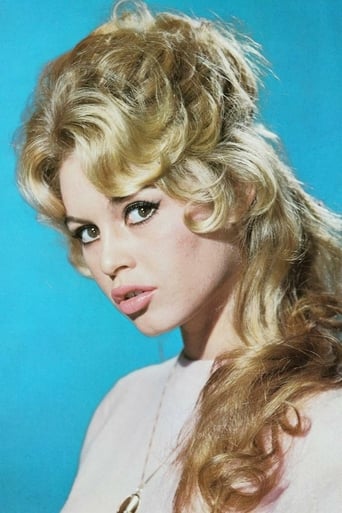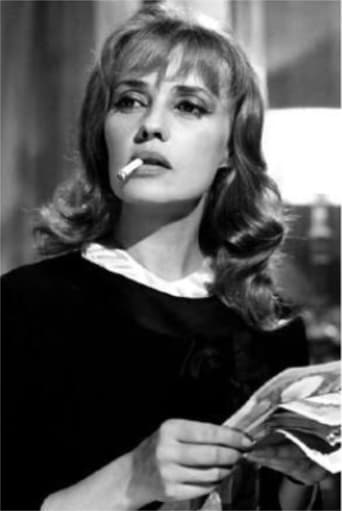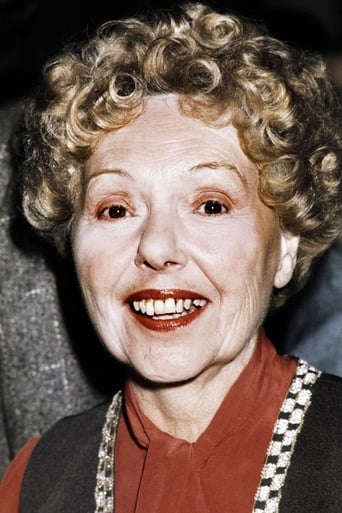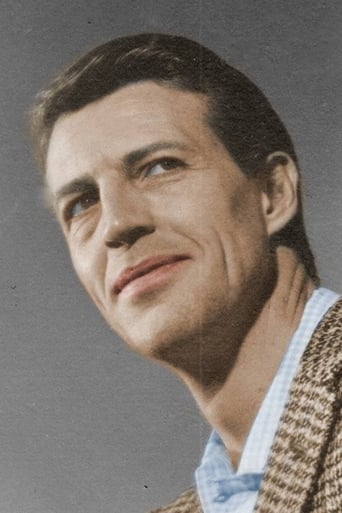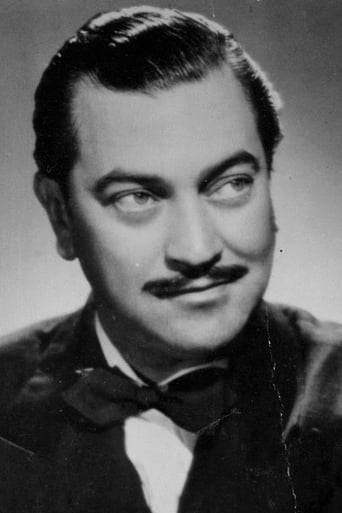Lancoor
A very feeble attempt at affirmatie action
Teddie Blake
The movie turns out to be a little better than the average. Starting from a romantic formula often seen in the cinema, it ends in the most predictable (and somewhat bland) way.
Rosie Searle
It's the kind of movie you'll want to see a second time with someone who hasn't seen it yet, to remember what it was like to watch it for the first time.
Billy Ollie
Through painfully honest and emotional moments, the movie becomes irresistibly relatable
Bardotsalvador
I love this movie from beginning to end this is one of the best movies from 1960s a very commercial one at the time of the movie Brigitte Bardot and Jeanne Moreau were at the peak of their fame Moreau was the erotic and intellectual muse of the best European director of the time and Bardot was the queen of the cinema her beauty was at the top she has no rival,by this time both star has work with Louis Malle he was at some point Moreau lover, the movie is set in the time of the Mexican revolution is a western and a musical at the same time, very well done and one of the biggest international hit of Moreau and B.B career , Claudio Brooks is in the movie a major Mexican actor and the star of Simon en el Desierto by Luis Bunuel, i just love this movie, George Hamilton is in it too , this IS a movie with the two most famous European star of the 20 century
Jay Raskin
This film is a glorious mess. Just when you think you have it figured out, it changes into a different style. You want a sexy musical romantic comedy, here it is, you want a slapstidk spoof, here it is, you want an action-filled spaghetti western, you got it. It is probably closest altogether in tone to "Cat Ballou". Altogether its an inventive sexy farce that captures the light and cheerfulness of the mid 1960's.Louis Malle seems to be channeling Richard Lester (the movie was made around the time of "Help" and "A Hard Day's Night") throwing gags right and left. He has the good sense to keep the camera on both Jeanne Moreau and Bridget Bardot for long stretches. Unfortunately, there is little chemistry between them, but they are both so sexy the viewer isn't sure who to focus on. The viewers' eyes dart from Bardot on the left to Moreau on the right and back again.If one sees it as a competition between Bardot and Moreau, I would have to say that Bardot wins hands down. She seems to genuinely to love her role, while Moreau seems a little nervous about having to compete with Bardot on the screen. Still both are at the top of their game as actresses and are a treat.The movie is unabashedly pro-revolutionary with classic Marxist ideology, something quite refreshing. The peasants are oppressed and noble, and the land-owners, army and Catholic priests are powerful and savage. The movie is pleasure on every level. If you enjoyed "Bandidas" with Penelope Cruz and Salma Hayek, you'll enjoy this film.
theowinthrop
This was an amusing film, which was the first movie that I saw starring either Bridget Bardot or Jeanne Moreau. I actually saw it on a double bill back in 1965. It is of interest because it brings up a matter that American films about Mexico's Revolution (or that of the other Latin American Countries) rarely touch upon. This is the position of the Roman Catholic Church in these matters.The only time the issue of the Church and the Revolutionaries came up in American films was in the John Ford / Henry Fonda movie "The Fugitive". That (based on Graham Greene's novel "The Power And The Glory")dealt with the anti-Clericalism of the PRI regimes that ruled the country after 1920. In it Fonda is a fugitive priest who is trying to continue his religious role, despite the anti-clericalism of the regime. Greene (and Ford) were good Catholics, and stressed the negative actions of the revolutionary regime in Mexico (similar to the anti-religious viewpoint of the Communist regime in Russia). But the view barely notes why the anti-Clericalism developed.One of the largest land owning groups in Mexico (and in most of Latin America's countries) was the Church. And, due to the holdings, the Church tended to be rather conservative politically. In the 19th Century the greatest figure of reform in Mexico was Benito Juarez, who was from a poor native Indian background. But most of his career was in trying to strengthen Mexican democratic government, and to drive the French invasion (that briefly set up Archduke Maximillian of Austria) as Emperor. But after the French were driven out, Juarez spent the remainder of his years in office (1867 - 1872) trying to get through some kind of fair land reform. This did not sit well with the Church. It supported the regime of his successor (Porfirio Diaz), who was opposed to land reform - he invited foreign investors (many Americans) into Mexico. Diaz's policies were good in giving Mexico a stable economy and political peace for three decades (the longest growth period until the later 20th Century).The key character to watch in "Viva Maria" is Francisco Regueira, who plays the sinister Father Superior. It is he who is constantly in communication with the dictator, the landowner, and their minions. The role (as is the film) is played for laughs, but it is his behavior, conspiring against the two Marias and their friends, which is telling.The plot is interesting in bringing in the universality of revolution. Bardot is shown growing up, the daughter of an Irish revolutionary, constantly destroying British forts and other sites with his daughter assisting. When she joins forces with Moreau the latter's sister has committed suicide, so that she needs Bardot to replace the sister. It is a circus group, but Bardot and Moreau do a singing and strip-tease act. They are brought into the Mexican Revolution by the brutality of the local landowner (who rules like he has a mini-kingdom).The film was pure escapism: the circus group's resident marksman finds one of his special rifles is badly bent after an explosion - he doesn't throw it out, but attach-es a mirror to the barrel and uses the bent gun to shoot people around the corner. George Hamilton plays a local "Zapata" type hero, who is wounded and in hiding. When Bardot speaks in his honor, the members of the circus group listen to her words comments critically on her use of language, and on his theatricality - as though she is acting on stage.It is not a major film, even for director Louis Malle (don't compare it with "Atlantic City", for example). But as an enjoyable romp it's worth watching.
zetes
Two vaudeville performers touring South America get involved in a revolution. It's somewhat similar to Woody Allen's Bananas. These two women are played by the impossibly gorgeous Brigette Bardot and the eternally pensive Jeane Moreau. The film is an action comedy, or at least that's what it's going for. But Louis Malle is definitely not up to it. He's actually one of my favorite directors of all time, but he has little idea what he's doing making this film. It must have been the most expensive French film at the time. Malle's previous film, The Fire Within, was a study on suicide and had about, I don't know, ten characters at the most. Viva Maria! has a billion extras and a ton of speaking parts. It also has elaborate action sequences. The whole picture comes off sloppy. The comedy is especially poor. Almost nothing hits, nearly everything misses. The jokes are very poorly timed. I think I laughed at one of them.Viva Maria! is worth watching though as a curio. Except for the comic moments, Malle's direction isn't bad. And Bardot and Moreau are always fun to watch. If for nothing else, watch it for the many strip teases they do near the beginning of the film. There are also a couple of very bizarre but wonderful scenes, like the almost Persona-esque "Lady in White" scene, where Moreau and Bardot (with a little magical help from the editing machine) dazzle, dizzy, and confound a Mexican baron. The color cinematography is also quite beautiful. It's worth a watch if you have nothing better to watch. 6/10.


